Reportage

Rohingya leader Mohib Ullah. Photo: www.hrw.org
It has now been over a week since the brazen killing of Md. Mohib Ullah, one of the most promising and articulate leaders of the Rohingya, and a source of inspiration and resolve to so many of the persecuted population. Police have made five arrests in the case filed by his brother so far, but doubts persist over the quality of the leads coming police's way.
On September 29, 2021, unidentified assailants gunned down Mohib Ullah, 46, chair of the Arakan Rohingya Society for Peace and Human Rights (ARSPH), in front of his home-cum-office inside the Kutupalong camp in Cox's Bazar, as he returned home from his Isha prayers. His associates said that Mohib Ullah had repeatedly reported threats from armed groups operating in the camps to Bangladesh officials but received insufficient support from the authorities.
At least a dozen activists have come forward to seek protection from the UN refugee agency, UNHCR, and Bangladesh officials since Mohib Ullah's killing because of renewed threats from armed groups and other risks of violence. Humanitarian workers said that the environment inside the camps has become increasingly dangerous for Rohingya activists.
Mohib Ullah had served as a leader among the nearly one million Rohingya refugees in Bangladesh. He began receiving death threats in 2019 as his prominence grew, representing the Rohingya at the UN Human Rights Council and with the United States government. His organization said that the threats were from the Arakan Rohingya Salvation Army (ARSA) and other armed groups that contested his leadership role, as well as his insistence on peaceful means towards realising their ultimate objective.
In the months before his death, Mohib Ullah had expressed concern about the growing threats, activists and his family members said. In August, he sent a letter to the Bangladesh government Refugee Relief and Repatriation Commissioner, with copies to the camp-in-charge official and Special Branch in Cox's Bazar, outlining the death threats that he and his colleagues had been receiving and requesting the office take action against the assailants, which the letter identifies as ARSA members.
One member of Mohib Ullah's group was told in July that he would be killed if he returned to the group's office, and that "very soon we will kill your leader." Mohib Ullah's colleagues said the letter received no reply. A Bangladesh police official said they had received no reports from Mohib Ullah about any threats or requests for protection.
ARSA condemned the killing in written and audio statements and demanded authorities bring those responsible to account. However Mohib in his letter to the authorities described a couple of incidents and threats he and his group experienced in July and August this year.
The letter read that the ARSA group of 40 people on July 30, 2021, visited the ARSPH office and threatened the security guards of Mohib not to stay in the office at night. The letter read that ARSA members again visited the shelter of Mohib Ullah on August 1.
'My security guards stood in front of them and I suddenly informed the APBn. When APBn arrived quickly, they ran away,' the letter read. On August 7, 2021, a group of 50 people gathered in a block opposite his shelter at 12:00am.
The letter, signed by Mohib Ullah, and shared by the ARSPH office on Monday, also shared a list of 61 ARSA policymakers and commanders and 14 of their operatives and detailed information on them including their locations, mobile phone numbers and position in ARSA.
Condemn, and probe?
In a statement, UN High Commissioner for Human Rights Michelle Bachelet said that Mohib Ullah's death "is a clear example of the insecurity in the camp, and the apparent attempts to silence moderate civil society voices."
UNHCR said that, in response to the killing, it "has enhanced its staff presence in the camps to ensure that the Rohingya refugees have direct access to support services and can report their concerns." However, activists close to Mohib Ullah said that they have not been provided with adequate protection.
On October 3, police reported that they had arrested five men in connection with the killing. Mohib Uullah's associates, however, have said that those allegedly responsible for the killing are still openly operating in the camp.
An activist with his group told Human Rights Watch, "Even this morning [October 3] some people visited my shelter and threatened my family saying, 'Ask your son to be ready because the same fate is awaiting him, like Mohib Ullah. He is on the hit list of 10 people.' I informed camp-in-charge, who assured me of safety, but I am worried because the police are not there all the time. If they really want to kill me, I'm an easy target for them." Mohib Ullah's wife said that she was worried for her daughters since her husband's killing because of recent threats demanding that they marry members of the armed group.
Some refugees alleged that Bangladesh security forces and camp authorities seemed to underplay threats from armed Islamist groups. "When we complain to the authorities about ARSA's crimes, they don't pay any attention," an activist told HRW.
Another activist alleged collusion between some officers of the Armed Police Battalion deployed in the camps and members of the armed group. He said he went into hiding after receiving threats from ARSA but returned to his shelter when police promised protection, only for them to hand him over to the militants. "I was always being threatened by ARSA members since I started working as an activist, and I finally went into hiding. A few months later, two police officers lured me to come back to the camp and then handed me over to ARSA. I had to go through inhuman torture, until I paid ARSA a heavy ransom."
ARSA members have attacked Christians and Hindus living in the camps alongside the predominantly Muslim Rohingya. Armed groups have also targeted women working as volunteers with humanitarian agencies. Hasina, a 26-year-old activist who works on women's empowerment, said she was a victim of extortion by ARSA members.
Bangladesh authorities should fully investigate all those who might be responsible for Mohib Ullah's killing and work with UNHCR to respond promptly when refugees are reporting imminent threats and provide immediate and effective protection, Human Rights Watch said. Concerned governments should ensure that activists and other refugees at heightened risk are priorities in planning around refugee assistance, protection, and resettlement.
"The Bangladesh government needs to address safety in the Rohingya camps both by developing better security and taking necessary action against groups engaged in illegal activity," Ganguly said. "These refugees fled horrific abuses and are entitled to support from Bangladesh and other governments to live in the camps without fearing for their lives."
Camp Crimes
Over the past four years there have been at least 108 incidents of killing in the Cox's Bazar Rohingya camps, according to a recent report of the Bangladesh Peace Observatory (BPO). Various quarters have expressed their concern not just about the killings in the Rohingya camps, but also the increase in various other crimes including abduction, rape, robbery, drug dealing and more. The activities of various armed criminals groups in the Rohingya camps have come to the forefront once again following the killing of Mohib Ullah.
According to the latest report of Bangladesh Peace Observatory (BPO) on security in the Rohingya camps and the degree of violence there, 108 persons were killed in the Teknaf and Ukhiya camps in the last four years up till this August.
Among the 108 persons who were killed, 78 were killed by miscreants suddenly and without warning, while 22 were killed in clashes and shoot-outs. Two were killed after being abducted and six were killed in various other incidents.
ARSA formed in 2012 in the wake of strife among Buddhists and Rohingya in Myanmar's underdeveloped and conflict-ridden northern Rakhine state. The group leveraged the anger and desperation of Rohingya facing daily oppression as an ethnic and religious minority. Through communal leaders, ARSA propagated a message of hope while in fact bolstering its position via a combination of claims to religious legitimacy and fear.
Operating under their former name Harakh al Yaqin in 2016 and as ARSA in 2017, the group claimed responsibility for two coordinated attacks on Myanmar police posts in northern Rakhine State-on October 9, 2016 and August 25, 2017-sparking widespread Myanmar military-led attacks on Rohingya civilians that amounted to the crime of genocide. In a July 2018 report, Fortify Rights identified 22 Myanmar military and police officials who should be investigated and possibly prosecuted for genocide and crimes against humanity.
The militants have been attempting to re-establish themselves as a political voice in the Bangladesh camps. Their key difference with Mohib Ullah lay in the latter's unflinching commitment to establishing non-militant leadership and self-governance.
ARSA does have sympathizers in the camps, but its authority is less clear than before the mass exodus, according to Crisis Group. In the view of many Rohingya, it was ARSA's attacks on Myanmar police that provoked the country's brutal, indiscriminate military campaign forcing them into exile. Foreign governments and human-rights organizations have branded this campaign as ethnic cleansing, crimes against humanity and possibly genocide.
Not all refugees hold ARSA responsible for the calamity that befell them. Some adopt the view that, whether or not ARSA's attacks had taken place, the Myanmar authorities would have found a way to drive the Rohingya from their land.
For a previous report, Fortify Rights also interviewed six members of ARSA, eyewitnesses to ARSA killings of Rohingya civilians, and 11 civilians who provided credible information that ARSA killed six Rohingya civilians in Rakhine State whom ARSA believed to be government "informants" in the weeks and days leading up to August 25, 2017. Members of ARSA told Fortify Rights that Atta Ullah, the head of ARSA, issued direct orders to kill specific and targeted Rohingya civilians, and local ARSA members in Myanmar carried out those orders.
Aside from ARSA, there are believed to be several small Rohingya militant groups in Bangladesh that have also sown fear among Rohingya refugees, said Fortify Rights. None of the militant groups appear to be well-trained or well-resourced and their ties to each other or outsiders are unknown.
In 2018, ARSA released a publication via Twitter in the English language stating that the group will "abide by the International Humanitarian Law (IHL) and will continue to refrain from any activities going against the IHL." The 69-page report condemned human trafficking, the illicit drug trade, the dowry system, and child abuse.
Members and followers of ARSA and other militant groups in Bangladesh should heed the group's recent video message and promote and protect the rights of all civilians and refrain from any unlawful behaviour, including killings, abductions, torture, and threats against women, critics, or suspected "informants," said Fortify Rights. ARSA should promote and protect freedom of thought and expression among Rohingya refugees in Bangladesh and civilians in Myanmar.
Since the refugee exodus, ARSA has continued its insurgency, claiming responsibility for an attack on a Myanmar convoy in January. It has also been linked to several killings in the camps.
In October last year, 47 Rohingya religious scholars issued a fatwa condemning any act of jihad, even for self-defence, against Myanmar. But Crisis Group's May report suggests that this ruling does not necessarily mean the Rohingya have abandoned ARSA or the idea of violent resistance. First, it was issued at the height of the exodus, when the scholars sought to reassure Bangladesh that the refugees were not a security threat. Second, it did not categorically reject violence, but rather denounced particular tactics the signatories viewed as premature or misguided.
Factors other than opposition to violence could hinder ARSA from representing the Rohingya. Village populations that once backed the militants are now scattered across the camps, new leaders (majhis) are emerging and the "common enemy" that ARSA rallied against - the Myanmar security forces - is far away across the border. Most refugees are preoccupied with the daily struggle to establish basic standards of living in the camps.
Nor does it appear that transnational jihadist groups - that is, groups such as al-Qaeda in the South Asian subcontinent, Islamic State (ISIS) or their Bangladeshi affiliates - have been able to exploit the Rohingya crisis to mobilize or recruit in the camps. While concerns this might happen are legitimate given the security landscape in Bangladesh, there is no evidence that it is occurring, nor that a counterterrorism lens is useful for understanding the evolving situation in the camps.
Smell the coffee
Bangladeshi authorities have always perceived a material gain in consistently denying any sort of presence in the refugee camps of ARSA, but following the assassination of Muhib Ullah this should prove far more difficult to maintain. The reasons behind this are not entirely clear, but most likely it is born out of the apprehension that admitting to the presence of international jihadists operating out of Dhaka may ultimately end up inviting international intervention
Just last year, Bangladesh officials reacted dismissively to reports in the Indian media that ARSA had a presence in the refugee camps, and were training alongside Bangladeshi groups of the same ilk. "There is no existence of ARSA or any other terrorist outfits in the Rohingya camps. And my force is not doing anything jointly with Indians to fight ARSA," Masud Hossain, the superintendent of police in Cox's Bazar, said at the time.
Prior to that in 2019, the Foreign Ministry was forced to release a statement to the same effect , in response to assertions by Myanmar.
"The government of Bangladesh reaffirms Myanmar that there are no ARSA activities at Rohingya camps," the Bangladesh Foreign Ministry said in a statement.
It's not possible to operate terrorist bases anywhere in Bangladesh because of high alertness and effective preventive measures by the security forces in line with 'zero-tolerance policy' of the Sheikh Hasina government," Dhaka said.
In the quest for justice for Mohib Ullah, Dhaka may find it has to set aside such positions, and proceed from a point that recognises the reality of the camps.










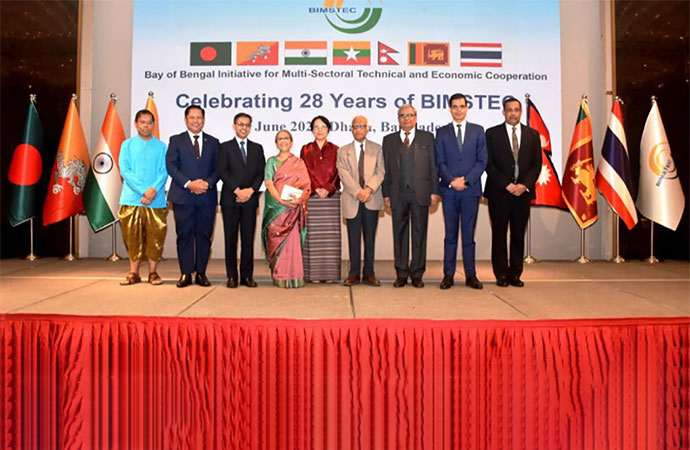








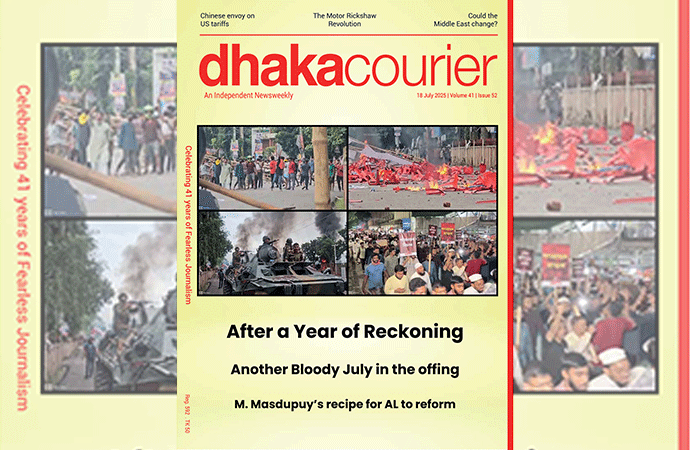

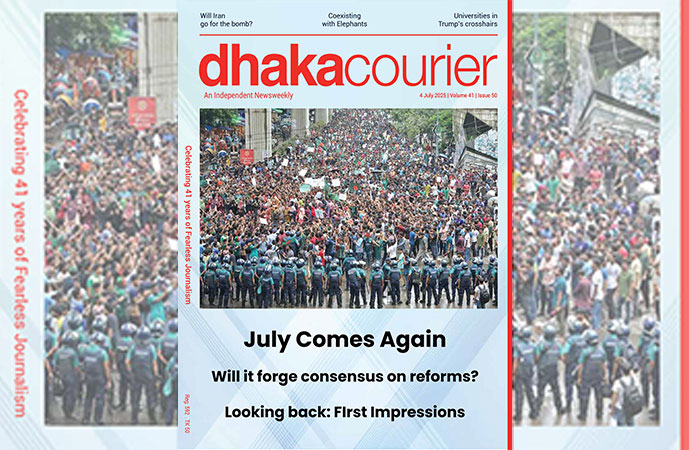
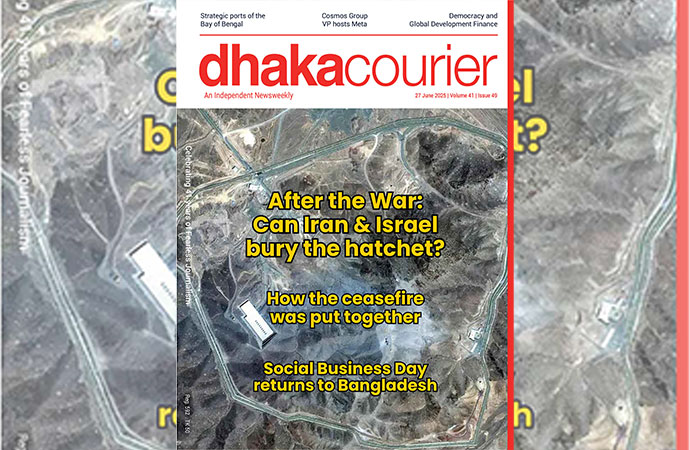
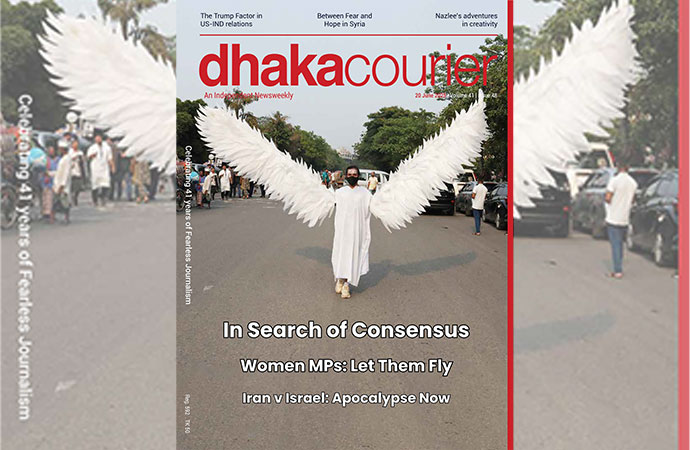
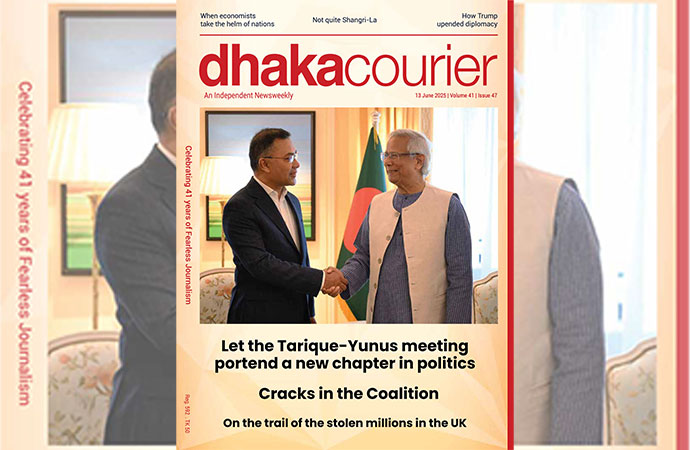
Leave a Comment
Recent Posts
The Northeastern Question
When secessionist movements sprang up across the Eastern European part ...
Trump’s Tariff: How far should ...
Will Bangladesh manage to get a last minute reprieve on its 'Trump tar ...
Rivers, Peaks, and Expressions – My Experience at th ..
What lies behind the alarming spike in violence agai ..
A Himalayan choice
Twenty Palestinians were killed at a food distributi ..